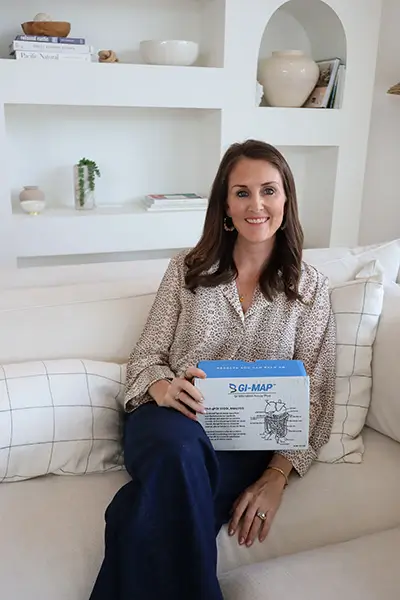If you’ve been dealing with reflux, bloating, constipation, or anxiety and can’t figure out why, histamines might be part of the puzzle. Many people try elimination diets, gut protocols, or supplements only to feel worse, not better. When histamine intolerance or mast cell activation syndrome (MCAS) are involved, the typical gut health approaches often backfire.
Prefer to listen instead of read? I have an entire podcast episode on histamine intolerance and gut symptoms:
What is Histamine Intolerance?
Histamine is a chemical messenger that helps your body respond to threats, regulate stomach acid, and keep your immune system alert. The problem comes when histamine builds up faster than your body can break it down.
That’s when histamine intolerance shows up. The symptoms can look different for everyone, but some of the most common gut signs include:
- Acid reflux that doesn’t improve with standard treatments
- Bloating or cramping after meals
- Constipation or diarrhea that swings back and forth
- Nausea or feeling overly full after small meals
Outside of digestion, histamine intolerance can cause anxiety, migraines, dizziness, heart palpitations, insomnia, and even skin reactions. Because symptoms appear across multiple systems, it’s often missed in traditional medical settings.
MCAS, Histamine Intolerance and Gut Health
Histamine intolerance is just one piece of the picture. MCAS, or mast cell activation syndrome, happens when your mast cells (immune cells that line connective tissue throughout your body) are constantly activated and release large amounts of histamine and other inflammatory chemicals.
This ongoing mast cell activation can drive histamine intolerance by keeping histamine levels elevated faster than your body can break them down. In other words, histamine intolerance is often a symptom of the bigger issue of MCAS, where the root problem is the overactive mast cells themselves.Histamine intolerance is just one piece of the picture.
When mast cells are triggered, they release histamine and hundreds of other inflammatory mediators. This can set off a chain reaction of symptoms, especially in the gut. Acid reflux, food reactions, IBS-like symptoms, and poor tolerance to detox or gut protocols are all common.
MCAS doesn’t stop with digestion. Because mast cells are everywhere, symptoms can show up in the nervous system (dizziness, POTS, migraines), cardiovascular system (racing heart, blood pressure changes), or immune system (chronic inflammation). This makes MCAS easy to dismiss or misdiagnose, but it also explains why gut work alone often isn’t enough.
Why the Gut Matters for Histamines
When it comes to histamine intolerance and MCAS, the gut is often the missing piece. You can change your diet or try supplements, but if the gut isn’t able to process and regulate histamine properly, symptoms will keep coming back. That’s because the gut is where histamine is broken down, where many mast cells live, and where the microbiome can either add to the overload or help calm it down.
Your gut plays a huge role in regulating histamines:
- DAO enzyme production: DAO, an enzyme made in the gut lining, helps break down histamine from food. If your gut lining is inflamed, DAO may be low and histamine can build up.
- Microbiome balance: Some bacteria produce histamine while others help degrade it. Dysbiosis or SIBO can tip the balance toward overload.
- Gut permeability: Leaky gut increases immune activation, keeping mast cells on high alert and worsening histamine symptoms.
This is why some people feel worse on aggressive SIBO or candida protocols. If your nervous system and immune system aren’t stabilized first, killing off bacteria can trigger a flood of histamine and leave you sicker than when you started.
What Helps if You Suspect Histamine Intolerance
Discovering that histamines might be behind your gut symptoms can feel like both a relief and a new challenge. Relief, because you finally have a possible explanation for why reflux, bloating, or IBS-type symptoms haven’t improved. A challenge, because histamine issues can show up differently for everyone and the path forward isn’t always straightforward. The good news is there are practical steps you can take to start calming your system and finding some relief.
If you’re wondering whether histamines are behind your gut symptoms, here are some practical first steps:
- Track patterns. Notice when symptoms flare whether that is around your cycle, after certain meals, or in times of stress. Many women see symptoms spike around ovulation when estrogen rises, since estrogen and histamine are closely linked.
- Support your nervous system. Histamine reactions are amplified when your body is stuck in fight-or-flight. Nervous system tools, limbic retraining, or even simple practices that help you feel safe can make a big difference.
- Try a lower-histamine diet short-term. Cutting back on high-histamine foods like fermented foods, vinegar, and citrus can reduce your total “bucket” while you work on deeper healing. This shouldn’t be forever, but it can provide relief while you stabilize. This is one of the few times when an elimination diet can be helpful.
- Go slow with protocols. Whether it’s supplements, antimicrobials, or detoxes, slower is always better when histamine issues are at play. Starting too aggressively is one of the most common reasons people feel worse.
Next Steps for Histamine Intolerance and Gut Symptoms
If histamine intolerance or MCAS is on your radar, it can feel overwhelming to know where to start. The symptoms are wide-ranging, they don’t always follow a predictable pattern, and often the standard approaches make you feel worse. The key is understanding that your gut, nervous system, and immune system are all connected, and once you support them together, healing becomes possible.
Histamine intolerance and MCAS don’t always look the same for everyone, which is why they’re often overlooked. But if you’ve been stuck in cycles of reflux, bloating, or unexplained symptoms that never fully resolve, your gut, immune system, and nervous system could be driving the reaction.
The good news is that once you understand how these systems connect, you can finally start addressing the real root causes and find lasting relief.
→ Ready to get clarity on whether histamine intolerance could be driving your symptoms? Purchase a Gut Health Audit to uncover what’s keeping you stuck
→ If you’re looking for deeper, one-on-one support, apply for the gutTogether® program and get a personalized plan to calm histamines, restore gut function, and feel like yourself again.








